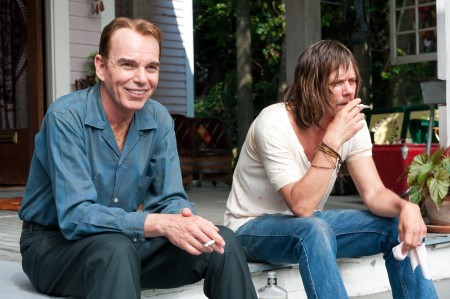25\06\2013
Written by Daan Rombaut
Seen: Jayne Manfield’s Car
After ten years of not being behind the camera, Billy Bob Thornton has chosen for the year 1969 to set his Alabama version of Chekhov. It’s the stage for two families – one American, one British – to unite over the death of the family fathers’ (ex-) wive Naomi. The well-off Southern Jim Caldwell (Robert Duvall) had been married to Naomi and had three sons and a daughter with her, until she left him for Britain and Kingsley Bedford (John Hurt), with whom she had a son and a daughter. Due to the everlasting resentment between the fathers of both sides, the families had never met before. Until now.
It was Naomi’s dying wish to be buried “among her people”, so the body and her family are flown to Alabama. From then on, the story unfolds into an intelligent and polished character drama. Carroll Caldwell (Kevin Bacon) is the rebellious anti-war and pro-drugs hippy, Jimbo Caldwell (Robert Patrick) is destined to become just like his father, and Skip Caldwell (Thornton) is the weirdo who clearly suffers from his war wound, although every single character has scars from their own wars.
Phillip Bedford (Ray Stevenson) is the stiff upper lip Englishman getting it on with Caldwell’s only (and married) daughter Donna (Katherine LaNasa), while Camilla Bedford (Frances O’Connor) gets into a strange poetry-recital sex thing with Skip.
Admittedly, it’s not the most original film, but the stellar performances and beautiful cinematography certainly make up for it. The film might sound overpopulated at this point and this usually leads to a diffusion of interest in each single mini-drama, but here you rarely feel this kind of disappointment – also because of the cast complementing each other brilliantly.
Nevertheless, the film seems a tad too long and in the final third, Thornton resorts to a cheap trick to solve one of the (not-so) mini-dramas. He lets Jim Caldwell’s grandson send the old man on an LSD-fuelled trip into the woods where he comes to a cathartis which seems to solve every familial discontent that had been brewing and festering for decades. Another stain on the trajectory is the final scene in which every warm feeling leading up to the scene immediately preceding, is crudely destroyed by Carroll’s son telling his father that he has joined the army and will fight in the Vietnam war. It’s not that this narrative element has no place in the film because it actually does, but it’s the placement which feels clumsy. It seems as if Thornton wanted to lend the film a claim at a deeper political resonance than it deserves. In trying to steer our attention away from where it had been directed for the hour-and-a-half before, the ending is counterproductive and frustrating.
Thanks to its acting and superb contrast between cultures, the film is able to get away with these flaws and the seldom instances of awkardness.
‘Jayne Manfield’s Car’ will be in Dutch cinemas as of 25th July.


